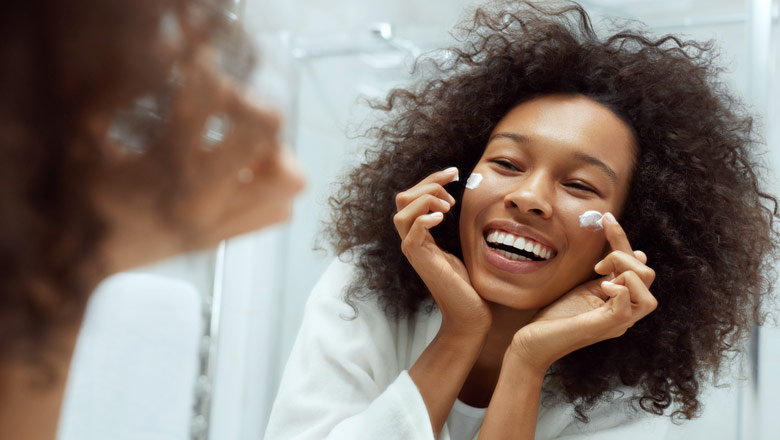
123RF.com (puhhha)
Your body is a complicated biome and your skin is no different. Prebiotic skincare and probiotic moisturizer help to support a healthy skin biome and are an alternative to harsh anti-acne products that destroy the beneficial microbes along with the bad ones.
I struggled for years with adult acne and tried everything in the book from DIY to prescription treatments and switching to prebiotic and probiotic skincare was a game-changer. Between that and sleeping on acne pillowcases, my skin is clearer than ever.
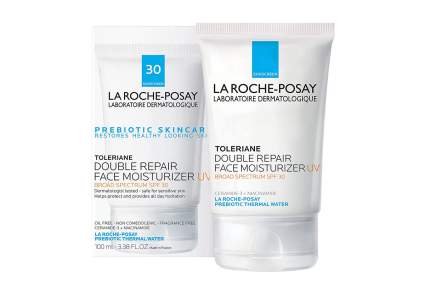
|
Amazon Customer Reviews
|
Price: $20.99 Shop at Amazon | Shop now Read our review |
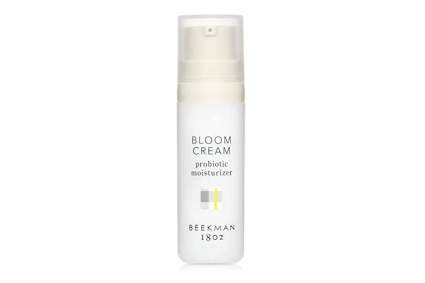
|
Amazon Customer Reviews
|
Price: $18.00 Shop at Amazon | Shop now Read our review |
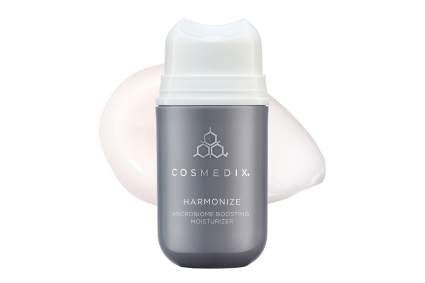
|
Amazon Customer Reviews
|
Price: $57.85 Shop at Amazon | Shop now Read our review |
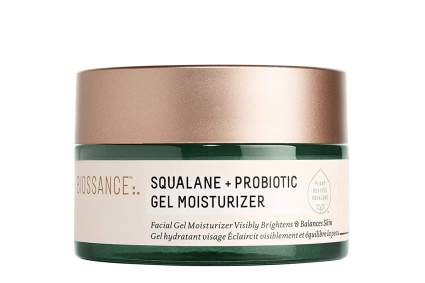
|
Amazon Customer Reviews
|
Price: $53.99 Shop at Amazon | Shop now Read our review |
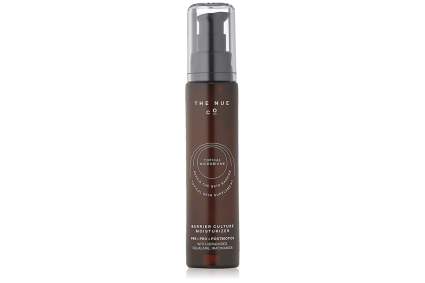
|
Amazon Customer Reviews
|
Price: $60.00 Shop at Amazon | Shop now Read our review |
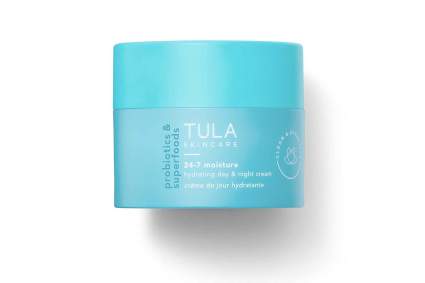
|
Amazon Customer Reviews
|
Price: $54.00 Shop at Amazon | Shop now Read our review |
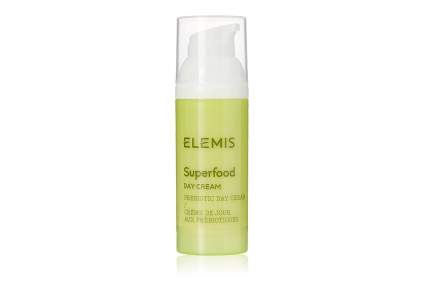
|
Amazon Customer Reviews
|
Price: $48.00 Shop at Amazon | Shop now Read our review |
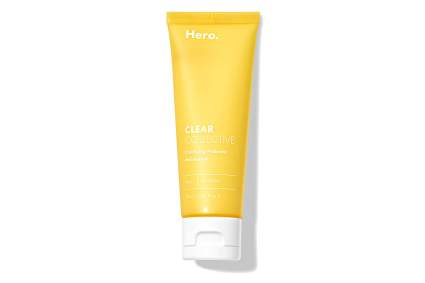
|
Amazon Customer Reviews
|
Price: $12.99 Shop at Amazon | Shop now Read our review |
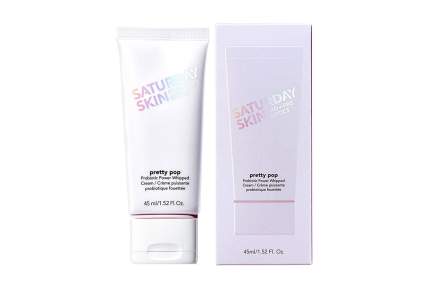
|
Amazon Customer Reviews
|
Price: $45.00 Shop at Amazon | Shop now Read our review |
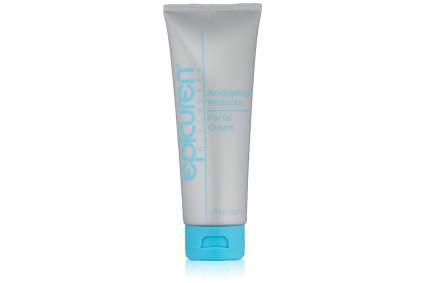
|
Amazon Customer Reviews
|
Price: $84.00 Shop at Amazon | Shop now Read our review |
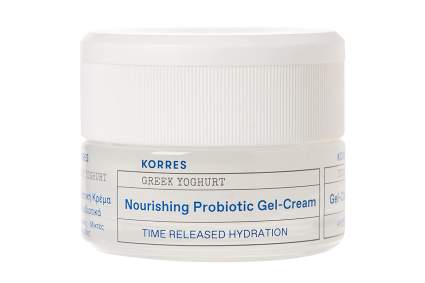
|
Amazon Customer Reviews
|
Price: $38.50 Shop at Amazon | Shop now Read our review |
-
1. EDITOR’S CHOICE: La Roche-Posay Prebiotic Toleriane Double Repair Face Moisturizer
Pros:- What I personally use
- Prebiotic thermal water
- UV protection
- Ceramide-3 and Niacinamide
- Oil-free
- Great for sensitive skin
Cons:- Contains silicones
- Contains PEGs
- Moisture may not last as long as advertised
After trialing multiple products, the La Roche-Posay Prebiotic Double Repair Face Moisturizer is the product I use every single day. For my sensitive but oily, acne-prone skin La Roche-Posay’s combination of prebiotics and oil-free moisture was exactly what I needed. My skin is clearer than ever other than the occasional hormone-driven blemish.
The prebiotics in this moisturizer are provided by thermal water. Thermal water is taken from natural thermal springs and is rich in minerals. A long list of benefits have been attributed to thermal water but Healthline identified the four that have research behind them. Thermal water can reduce UV damage with antioxidants, improve moisture, reduce inflammation in the skin, and support your skin’s natural biome by feeding beneficial bacteria.
Along with the thermal water prebiotics, the moisturizer includes ceramide-3 and niacinamide which help to support the growth of the protective barrier provided by your skins cells so you don’t lose more moisture. This barrier will also defend your skin from the damage of UV rays and pollution.
On top of that, it has Broad Spectrum SPF 30 protection which we all should be using on our faces anyway. That does make the moisturizer feel more opaque and thick when you’re applying it and that got me nervous about breakouts when I first started using it. Particularly because I was testing this against the much thinner Hero Cosmetics moisturizer (literally applying each of them to half of my face for months) but I didn’t run into any breakout issues and the La Roche-Posay side outperformed my other products.
I also thankfully finished my trial before summer or else my half-SPF-covered face would have looked seriously weird.
This is an oil-free product from their Toleriane line, which is made especially for those of us with sensitive or acne-prone skin. It’s free of oils, dyes, fragrances, parabens, or drying alcohols. It does contain some silicone products and PEG-100 stearate if those are ingredients you are trying to avoid but doing the research for our silicone hair serums helped me understand how helpful silicone can be in cosmetics.
I have been pairing this with the La Roche-Posay Thermal Water Body Lotion to prevent body acne as well.
Find more La Roche-Posay Prebiotic Toleriane Face Moisturizer information and reviews here.
-
2. Beekman 1802 Bloom Cream Probiotic Face Moisturizer
Pros:- Trusted brand
- Goat milk and colostrum
- Aloe and botanical extracts
- Great for dry to normal skin
Cons:- Not actually probiotic
- Not vegan
- Not for acne-prone or oily skin
- Pricier
When people think of probiotic skin products, they probably think of the Beekman 1802 Bloom Cream Probiotic Face Moisturizer. It’s a well-known brand with widespread praise and for a good reason. (Please note, that I’m featuring the 0.5-ounce sample bottle here so you can see if you like the product before investing in the 1.69-ounce bottle.
Being from Beekman 1802, it’s made with goat milk which comes with enormous benefits for your skin’s health including nourishing proteins, anti-inflammatory properties, and lactic acid acting as a gentle chemical exfoliator. You can find more info on goat’s milk and skincare specifically in our Goat Milk Lotion article.
Uniquely, this moisturizer also includes colostrum which Cleveland Clinic explains is the milk produced for the first few days after birth. It is thicker and a different color than regular milk and it’s more densely nutritious and high in antibodies. It’s essentially concentrated goat milk and goes a long way toward softening and renewing skin. I was initially wary when I saw this on the ingredient list as it seems like the baby goats probably need that colostrum but Beekman 1802 puts a lot of care into the treatment of their goats to farm their milk ethically.
Here’s the thing though–it’s not probiotic. It says right on their website that it does not contain live cultures so, in my opinion, they shouldn’t be advertising their product as probiotic.
It does contain prebiotics to support your natural biome and postbiotics. According to Dermatology Times, postbiotics are non-living bacteria and the by-products those bacteria created while they were alive. Basically, if you took a probiotic solution and then sterilized it so there were no viable microbes inside, you’ve got a postbiotic solution. Postbiotics have been shown to have great benefits for your skin and include things like helpful enzymes, lactic acid, and proteins.
I will also say that while most people don’t seem to report issues if you have oily skin or are very prone to acne, this might not be for you. The second ingredient is Coconut Alkanes which are comedogenic. If I put anything with coconut products near my skin, it’s game over. However, if you tend to have normal or dry skin, this moisture plus the goat milk may be just what you need.
Find more Beekman 1802 Bloom Cream Probiotic Face Moisturizer information and reviews here.
-
3. COSMEDIX Harmonize Microbiome Boosting Moisturizer
Pros:- Luxury product
- Antioxidant botanicals
- Artificial fragrance free
- Doesn't feel heavy
- Squalane and mango seed butter
Cons:- Not actually probiotic
- Not everyone likes the pump bottle
- Pricey
For dry and combination skin, we have the Harmonize Microbiome Boosting Moisturizer by COSMEDIX. They lean hard on the natural benefits of botanical ingredients high in antioxidants to counteract the daily oxidative damage our skin receives from pollution and the sun. Oxidative damage looks like what you would label as aging, so a product packed with these ingredients is great for helping reduce signs of aging.
So what are these botanicals? Extracts of ginger, grape, Indian frankincense, Chlorella vulgaris which is a photosynthetic microalgae, golden root, chaga mushroom, reishi mushroom, ashwagandha, quaking aspen bark, lavender, and snow fungus which has been compared to hyaluronic acid in its ability to retain moisture. Each of these brings its own list of benefits from fighting free radicals, reducing inflammation, and improving skin texture.
Let’s get down to the probiotics. Like most of the products out there, it claims to contain probiotics but the ingredients read Lactobacillus ferment lysate filtrate which means they took a culture of Lactobacillus and whirred it up until all the cell walls have broken down allowing your skin access to the nutrients inside, this was then filtered for the best end result. By the end of that process, those bacteria are far from alive, making it a postbiotic solution. I really like that this ingredient is so high on the list so you know there’s a good amount of it in there and it’s not just in there for show. The moisturizer also has xantham gum which can act as a prebiotic to good bacteria already part of your skin biome.
Find more COSMEDIX Harmonize Microbiome Boosting Moisturizer information and reviews here.
-
4. BIOSSANCE Squalane & Probiotic Gel Moisturizer
Pros:- Lightweight gel
- Red seaweed and ginger extracts
- Exfoliating lactic acid
- Nourishing Lactococcus Ferment Lysate
- Vegan and cruelty-free
Cons:- Not really a probiotic
- Pricier
- Not enough moisture for some
Those who don’t like the weight of heavy moisturizers should consider BIOSSANCE Squalane & Probiotic Gel Moisturizer. Squalane is a non-comedogenic moisturizer that your skin will love because it already uses it. Squalane mimics the natural oils that your body produces. In fact, according to an article in Advances in food and nutrition research, sebum (our natural oils) are made up of 13% squalane. If you have dry skin, squalane can help replace your lost oils.
In the past squalane was obtained from animals through some less-than-ethical means but these days, most squalane is sourced from plants. BIOSSANCE gets its squalane from sugar cane.
This light gel moisturizer also contains Lactococcus Ferment Lysate which is where they’re getting the probiotic in their name. To be clear, Lactococcus Ferment Lysate is a postbiotic. There are no live cultures in the product so you can’t technically call it a probiotic.
That isn’t to say there aren’t huge benefits to this ingredient. Lactococcus Ferment is a probiotic that produces lactic acid (great for skin). The “lysate” portion means that the cells in the ferment have been split apart, releasing the contents that were trapped behind cell walls so they’re easier for your skin to make use of the different components.
Users tend to either fall in love with this or find it irritating (probably the ginger extract). They make a 0.5-ounce bottle which is probably worth testing out before going for the full-size bottle.
Find more BIOSSANCE Squalane & Probiotic Gel Moisturizer information and reviews here.
-
5. The Nue Co. Pre & Probiotic Barrier Culture Moisturizer
Pros:- Pre, pro, and postbiotics
- Gel to cream formula won't feel heavy
- Vegan and cruelty-free
- Fragrance-free
Cons:- Pricier
- No SPF
- Cells recognized as live but not actually living
The Nue Co. Barrier Culture Moisturizer understands the difference between prebiotic, probiotic, and postbiotic and we love to see it. The lightweight gel-to-cream claims to contain all three, though they’re riding the line on actually being probiotic. This luxury moisturizer is designed to nourish your skin’s biome and then prevent your skin’s natural barriers from losing moisture with squalane, ceramides, and niacinamide. It’s pricier than some but with an ingredient list like this, it’s worth the splurge.
For prebiotics, this moisturizer contains polysaccharides from chicory root and starch from potatoes. I’m not going to lie, potato starch threw me a bit, but the point is to feed the good bacteria on my skin and, I mean, I love eating potatoes. My skin biome deserves a little treat too, right?
For probiotics, they include Lactobacillus plantarum, the culture used to make fermented foods like kimchi. Their website acknowledges that having “live” bacteria in cosmetics is difficult but they’ve gotten around this by using a patented process on the Lactobacillus plantarum that preserves the cells enough that when the cream is applied, your skin can’t tell the difference between live Lactobacillus plantarum and non-living Lactobacillus plantarum. So technically the culture is postbiotic but your skin thinks it’s probiotic. The purpose of this is to boost your skin’s natural defenses by introducing a “threat.” Sort of like a vaccine so that your skin will be more ready to fight off the next bad bacteria you come in contact with.
To hydrate and improve skin texture, the Barrier Culture Moisturizer is packed with squalane (derived from olives) to mimic your skin’s natural moisture barrier, as well as ceramides to bolster your skin cells, and niacinamide to lock in moisture and boost your skin’s natural defenses. To reduce inflammation and redness, they also included extracts of calendula and chamomile.
Find more The Nue Co. Pre & Probiotic Culture Moisturizer information and reviews here.
-
6. TULA Probiotic Skin Care 24-7 Moisture Day & Night Cream
Pros:- Pre and post biotics encourage a healthy biome
- Squalane restores moisture
- More botanicals than we can list
- Great for all but highly acne prone
Cons:- Does not contain live cultures
- PEGs and Hydrogenated vegetable oil
- Contains fragrance
- Not vegan (yogurt)
For those who like their products to make use of the healing properties found in nature, check out TULA’s Probiotic Skin Care 24-7 Moisture Day & Night Cream. Founded by a dermatologist, TULA loves to include botanical extracts in its products, and for good reason. These extracts can fight oxidation, reduce inflammation and redness, be antimicrobial and antifungal, and promote the general health of your skin.
This cream contains extracts of blueberry, green tea, camelina (wild flax), turmeric, apple, watermelon, chicory, and lentil fruit–as well as oils of Mexican juniper wood, palo santo wood, orange, lemon, safflower, olive, and ylang-ylang flower. That’s a plant-full list.
Chicory root serves as the prebiotic here to support your biome. For probiotics, they included yogurt extract and Bifida Ferment Lysate though the ingredient list clearly states that it contains no active cultures so we’re actually dealing with postbiotics again–but I think we’re used to that by now. Bifida Ferment Lysate is a great culture choice when it comes to benefits to the skin. It’s packed with proteins that help repair damaged skin, ease inflammation, and prevent further UV damage. It’s a main ingredient in the famous Estee Lauder Advanced Night Repair line.
In case you couldn’t tell by the 24/7 in the name and all those botanical oils, this cream is meant to be very hydrating. It accomplishes this long-lasting moisture with squalane, glycerin, safflower oil, olive oil, lipid-rich alcohols (not the drying ones), and hydrogenated vegetable oil.
This is great for folks of most skin types other than those who have a high sensitivity to added oils. Their product info says that this is non-comedogenic and if you can use moisturizers that aren’t oil-free, then you should be good to go. As someone with exceptionally reactive skin who gets a breakout from just looking at a face oil, when I see hydrogenated vegetable oil on an ingredient list, I start running. So just be aware of the type of moisture your skin likes.
Find more TULA Probiotic Skin Care 24-7 Day and Night Cream information and reviews here.
-
7. ELEMIS Superfood Prebiotic Daily Moisturizer
Pros:- Lightweight gel
- Botanical oils as well as extracts
- Antioxidants for days
- Anti-inflammatory matcha green tea
Cons:- Contains fragrance
- Contains antibacterial
- No SPF protection
Elemis is known for its spa-worthy, botanical-rich formulas and Superfood Prebiotic Daily Moisturizer delivers on their reputation. The lightweight day cream is moisturizing without feeling heavy yet leaves you with a dewy glow. This is a good choice for people battling redness as the matcha green tea in this is great for calming skin inflammation.
Superfood contains maltodextrin as a prebiotic to fuel good bacteria. I also spotted caramel in there but I’m not sure if that has another purpose or if they’re giving your good bacteria the luxury treatment. You can also find Lactobacillus if you scan the ingredient list but probiotic isn’t listed anywhere on their product page or website page so I have to assume this is a post-biotic. I low-key think they included Lactobacillus for people who wouldn’t read to know what “prebiotic” means and were expecting to see Lactobacillus on the ingredient list. Either way, this is just only more good news for skin benefits.
Now I love to see botanical extracts but I’m a real sucker for botanical oils. Extracts are plant essences suspended in liquids like water or alcohol. It’s sort of like a tea so they’re diluted in another substance. Botanical oils come from distilling the plant down to its volatile oils. They’re purer, more concentrated, and more readily absorbed into the skin.
Superfood makes use of cucumber oil, chia seed oil, broccoli seed oil, orange peel oil, balsam torchwood bark oil, palmarosa grass oil, rosemary leaf oil, carrot seed oil, and sunflower seed oil. Broccoli seed oil is particularly great for skin care because it is so high in omegas and is fantastic for trapping moisture in your skin. For extracts, they included ginger, goji berry stem, green mandarin, daikon radish, rosemary, and two types of honeysuckle.
One interesting inclusion I’m not so sure about is Chlorophyllin-Copper Complex, which is a synthetic combination of copper molecules and chlorophyll according to this article in Cosmetic and Investigational Dermatology. The result is anti-inflammatory, antioxidant, and antibacterial. I’m all for killing the bacterial that cause acne but this is an interesting choice for a prebiotic cream.
Find more ELEMIS Superfood Prebiotic Daily Moisturizer information and reviews here.
-
8. Hero Clear Collective Clarifying Prebiotic Moisturizer
Pros:- Great intro product
- Fragrance-free
- Sage, pineapple, and yuzu extracts fights acne
- Silicone and mineral oil free
Cons:- Not moisturizing enough for some
- No SPF
- Contains hydrogenated vegetable oil
This one is a good choice for people on a budget who don’t require a heavy moisturizer. I used the Clear Collective Clarifying Prebiotic Moisturizer by Hero Cosmetics for three months while testing out several products. It contains prebiotic sugars that feed the good bacteria that are supposed to live on your skin so they can push out the bad acne-causing ones.
I was using it on half my face to compare to another moisturizer and I found it to be a very lightweight moisturizer that never felt greasy to me and was fast to absorb. It had absolutely no fragrance which I appreciate.
I have sensitive, oily skin and very stubborn acne and compared to non-prebiotic moisturizers, the Hero Clear Collective Moisturizer did a good job at preventing acne before it started. It didn’t perform as well as the La Roche-Posay moisturizer in my testing, but for the money, it took me down to an average of two blemishes compared to just endless painful pimples.
In addition to prebiotics, this one also contains glycolic acid which acts as a gentle AHA chemical peel to remove dead skin and dirt that can clog pores. Historically, my skin doesn’t respond well to chemical exfoliators like salicylic acid or glycolic acid so my money is on that is why this moisturizer isn’t the one I use daily. If you’ve had good luck with these types of exfoliators, then this one is definitely worth a shot.
It also contains hyaluronic acid (helps retain moisture), sage extract (anti-microbial), witch hazel (tightens pores), and pineapple which contains bromelain, an enzyme that helps to remove dead skin buildup.
Another reason it might not have worked for me is that it contains hydrogenated vegetable oil–an ingredient I tend to avoid. There’s no definite study I’m aware of that says for sure how great hydrogenated vegetable oil is for skin, but the San Diego Acne Clinic lists it among oils that don’t belong near acne-prone skin.
In the end, I kept this moisturizer as a backup but found it wasn’t quite moisturizing enough to slow my oil production likely due to irritation from the glycolic acid.
Find more Clear Collective Clarifying Prebiotic Moisturizer information and reviews here.
-
9. Saturday Skin Pretty Pop Prebiotics & Probiotics Whipped Cream
Pros:- Appears to contain live cultures
- Hydrating and smoothing for skin that needs plumping
- Vegan and free of gluten, artificial fragrances or dyes
- Nourshing botanicals like okra, white lupin, rosemary leaf
Cons:- Contains PEGs
- Contains denatured alcohol
- Need to watch the expiration date
- Pricey for a 1.5-ounce bottle
Saturday Skin’s Pretty Pop Prebiotics & Probiotics Whipped Cream appears to be coming in with actual live probiotic cultures. There’s nothing on their product page or website that states that their probiotics do not contain live cultures and this line of K-beauty creams is often listed as one of the few live culture probiotic skincare products.
It contains four different cultures: Lactobacillus ferment, Streptococcus thermophilus ferment, Lactococcus ferment lysate, and Bifida ferment lysate. The two lysate cultures are post-biotic (not alive) because lysate denotes that their cells have been broken apart for easier absorption. The first two, however, appear to be live cultures so make sure you’re keeping an eye on the expiration date as the shelf life of live probiotics is going to be shorter than typical moisturizers. Pretty Pop also has prebiotics in the form of sucrose, corn starch, and maltodextrin to fuel these good bacteria.
It’s formulated for dry skin and skin that has lost some elasticity and needs smoothing or plumping. That makes it a good choice for aging skin that could use a little more spring in its step. Exceptionally oily skin that is prone to acne may not be the best candidate for this moisturizer.
To achieve this, it’s packed with niacinamide, glycerin, hydrogenated lecithin, shea butter, and adenosine which is known for its ability to soften the appearance of wrinkles. For botanicals the formula includes extracts of Texas Cedarwood, okra, white lupin, orange peel, lemon peel, grapefruit peel, eucalyptus, moringa, lavender, and rosemary. That said, it does contain denatured alcohol, a drying and mattefying agent, so if you’re trying to avoid this ingredient, skip this one.
Find more Saturday Skin Pretty Pop Pre & Probiotics Cream information and reviews here.
-
10. epicuren DISCOVERY Acidophilus Probiotic Facial Cream
Pros:- Lactobacilli Acidophilus enriches skin
- Micronized Silver reduces harmful bacteria
- Deeply moisturizing shea, macadamia, sunflower seed, and aloe
- Hyaluronic acid
Cons:- Not probiotic as listed
- Earthy smell not everyone likes
- A splurge
- People with nut allergies may need to skip this one
Epicuren DISCOVERY Acidophilus Probiotic Facial Cream is a cream that provides lots of moisture for those with thirsty skin while helping to prevent acne with micronized silver. It’s rich in moisturizing oils like shea butter, sunflower seed oil, aloe vera, hyaluronic acid, and macadamia oil which is surprisingly similar to the natural oils of our skin. All of these oils are considered non-comedogenic and won’t clog your pores.
Like the other creams on this list, although it’s billed as probiotic, this moisturizer is postbiotic meaning that while it does contain Lactobacillus bacteria, it is no longer alive. So they take a probiotic and unalive it before adding it to their product. Why? Because it’s more stable and even non-living Lactobacillus Ferment can benefit skin health by providing essential building blocks.
An ingredient we have not seen in other moisturizers here is micronized silver, tiny bits of silver suspended in liquid. That sounds weird but silver is antimicrobial and good for controlling the population of acne-causing bacteria without irritating your skin. I sleep on a Silvon pillowcase every night which is infused with silver and helps prevent acne.
Botanical extracts like green tea, chamomile, and cucumber soothe skin, reducing inflammation and redness. It does contain added fragrance but most say it has an earthy fermented smell due to the high postbiotic content.
Find more epicuren DISCOVERY Acidophilus Probiotic Facial Cream information and reviews here.
-
11. KORRES Greek Yoghurt Nourishing Probiotic Gel-Cream
Pros:- Probiotic plus real yogurt
- Botanical extracts
- Luxury brand
- Silicone-free
Cons:- Pricey
- More of a thicker gel than a lotion
- Fragranced
When you think about probiotics, you probably think about yogurt. KORRES Greek Yoghurt Nourishing Probiotic Gel-Cream contains both yogurt and yogurt powder as well as added lactobacillus probiotics. There’s no information on whether or not cultures are alive or not anywhere that I can find but yogurt as an ingredient does suggest that it does contain live probiotic cultures. To support healthy bacteria, it includes maltodextrin as a prebiotic.
If you like a nice thick moisturizer, this one is for you. It’s a thick gel that smoothes over your skin like a barrier against dryness that you can feel.
This isn’t for those who want short, all-natural ingredient lists. It’s super hydrating, but the ingredient list is pretty long and unpronounceable. Some of those long Latin-y words represent things like passionflower oil and yacón root juice that are very botanical but they get lost in the sea of alpha-glucan Oligosaccharides.
It has a pleasant fragrance that doesn’t last long after you apply it but if you like a moisturizer to smell nice, that’s a bonus.
Find more KORRES Greek Yoghurt Nourishing Probiotic Gel-Cream information and reviews here.
What's the Difference Between Probiotic, Prebiotic, & Postbiotic?
There are pretty significant differences but they're all working toward the same goal.
Prebotics contain non-living components that are targeted to help beneficial bacteria thrive so they can out-compete the bad bacteria.
Probiotics contain live beneficial bacteria meant to help balance your biomes.
Postbiotics are previously probiotic solutions that are no longer alive.
Why Do I Need Bacteria On My Skin?
Your skin has a biome and needs a healthy population of helpful bacteria but they are often killed in the friendly fire of harsh cleansers and anti-acne products that aim to remove the bad bacteria.
Your benzoyl peroxide cleanser doesn't know the difference between bacteria that cause acne and the bacteria that keep you healthy.
What Are the Benefits of Prebiotic Skincare?
The goal is to have so many good bacteria in your skin biome that there isn't room for bad bacteria.
Think about your skin for a second as a fight between the good bacteria and the bad bacteria.
Probiotics are like adding troops to the good side.
Prebiotics make the troops you have better and stronger.
A prebiotic moisturizer helps feed your good bacteria so they can thrive, leaving no room for acne-causing bacteria.
In my experience, prebiotic moisturizers have been most effective in balancing my complexion.
What Are the Benefits of Probiotic Skincare ?
Probiotic skincare is similar to your doctor telling you to take probiotic pills for your stomach. Your digestive system needs helpful bacteria to function so when you've been sick, you replenish your gut biome with probiotics.
It's the same with probiotic skincare products. They help restore your skin's biome.
Where Are the Probiotic Moisturizers Then?
That's a very good question. I have yet to find a moisturizer that is actually probiotic. There are plenty that are advertized as probiotic but they do not contain live cultures.
If a product contains probiotic bacterial but does not contain live cultures, it's postbiotic.
The scientists at ISAPP (International Scientific Association for Probiotics and Prebiotics) have an article specifically about this: Dead bacteria – despite potential for benefit – are not probiotics.
The title sort of covers exactly what's in the article. A lot of industries are using probiotic and postbiotic interchangeably and these scientists are not having it.
They give one example of someone claiming that sourdough bread is probiotic. Eating uncooked sourdough dough would be probiotic (and unwise) but once the bread has been baked, all those probiotics are now postbiotic.
Postbiotics are still highly beneficial to your skin but not for the reasons the word "probiotic" would make you think. Postbiotics are the non-living ferment (which your skin can use as a prebiotic) as well as whatever those bacteria were producing which include skin-happy enzymes and things like lactic acid, a well-trusted chemical exfoliant.
Postbiotics are great for your skin but it's frustrating that they are so mislabeled.
So Why Is The Article About Probiotic Skincare?
Because this is the word you're going to find on the products. If you want biome-centric skincare, "probiotic" is the term the industry is going with most of the time, whether or not it is scientifically accurate.